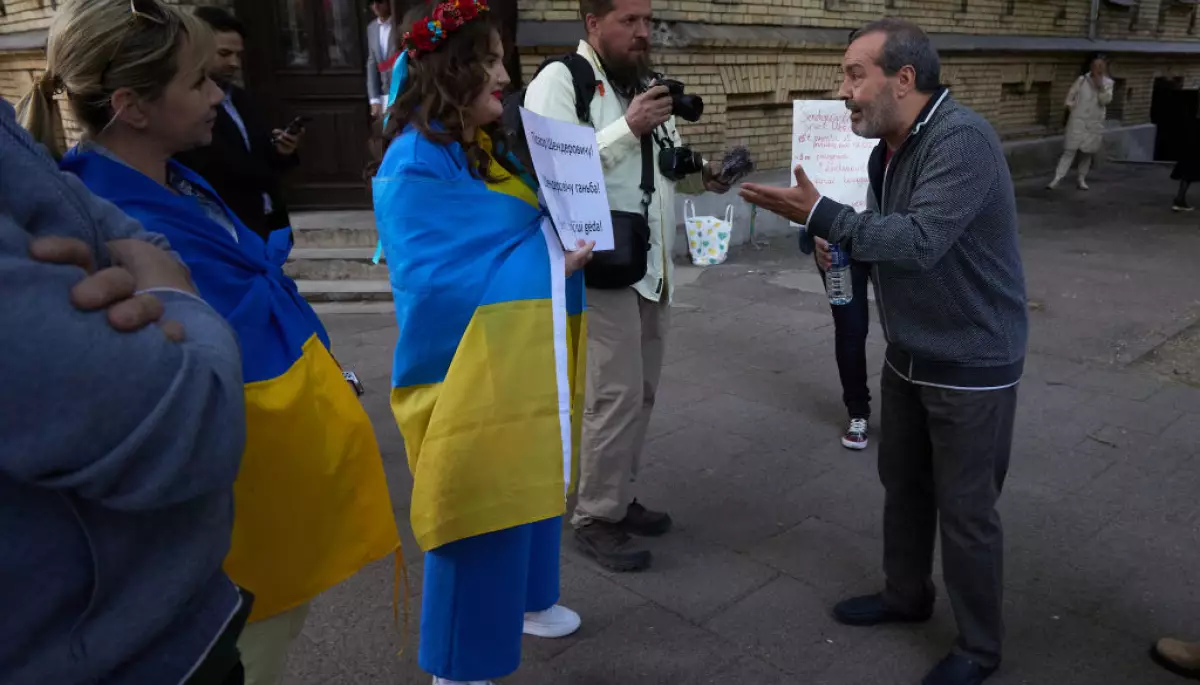Українською читайте тут.
This piece extends the discourse regarding “good Russians” on the pages of Detector Media. Read here about how the Russian “opposition” channel portrays Russians as victims. In this regard, read DM columnist Liena Chichenina’s opinion here. The opinion of Natalia Lyhachova, head of the NGO Detector Media and editor-in-chief of the DM publication group, is available here, and the opinion of Dmytro Zolotukhin, media expert and executive director of the Institute of Post-Information Society NGO, can be found here. Belarusian reporter Nasta Zakharevich has penned an account about a conference in Riga on Ukrainian and Russian(!) refugees, to which Ukrainians weren’t invited. Now, she delves into the problematic issue of “good Russians”.
The term “good Russians” has turned into a derogatory term for many, yet those it refers to often fail to comprehend their flaws. They oppose war, they hate Putin, and some even extend assistance to Ukrainians. So, why don’t they receive the appreciation and acknowledgment they anticipate from these Ukrainians? What missteps are the “good Russians” making, and why do their deeds and words frequently contribute to the soft Kremlin propaganda?
Why Listen When You Can Talk
A common grievance against these so-called good Russians is their unwillingness to listen to Ukrainians, choosing to voice their own views instead. For instance, Russian journalist Marina Ovsyannikova, a long-time associate of Channel One, believed it apt to seek employment in Ukraine following her “No to War!” protest and subsequent departure from Russia. When her decision stirred outrage among Ukrainians, she retorted that her actions were in defense of Ukraine and, thus, not misguided. She deemed that her reporting from a nation targeted by the propaganda outlet she formerly served should not just be accepted but also thanked and acknowledged.
· Read also: Insights on Ovsyannikova’s Failed Press Conference in Kyiv
Refusal to accept that victims may deny forgiveness and apologies is a prevalent narrative among such individuals. Their perception is straightforward: they first inflict harm, then promise to abstain from it, expecting to be lauded for this commitment. If not, they label the victims ungrateful.
However, there exists another variant of “good Russians” — the haughty humanists. They are prepared to endure resentment, but only if the resentful are deemed to have lost their rationality due to their experiences.
These individuals reject the notion that refusing to forgive or reconcile with “good Russians” could be a rational stance. Still, they are willing to endure bitter remarks from Ukrainians living under bombardment. This stance is quite convenient: firstly, it allows them to present a humble facade to the public, and secondly, they are not obliged to act upon what they hear. As per them, when Ukrainians demand that Russians remain silent, it’s not a reflection of their genuine wishes or interests but a consequence of enduring stress and understandable emotional upheaval.
It’s All Putin’s Fault
The shunning of collective responsibility and the refusal to ponder why the Russian populace largely backs the war against Ukraine is another hallmark of numerous “good Russians.” They sidestep self-reflection on how long-held ideological beliefs have shaped Russians into proud imperialists who continuously glorify occupation. They assert the war is solely Putin’s doing and no other Russian desires it. Perhaps, apart from Putin, some, like Prigozhin, stand to gain from it, but the rest of the Russians remain uninvolved.
This narrative finds clear expression in an interview with journalist Masha Gessen on the Dozhd (Rain) TV channel. The interview titled “This is only his war” addresses the assertion that save for Vladimir Putin, no one considers the war their own. Gessen offers this observation after Mikhail Fishman, the interviewer, proposes that society be “excused from the picture” as “it is obvious that this is Putin’s personal war, it is his personal operation, his personal revenge if you will, his emotions that drive him individually as a person”.
A more radical variation of this narrative was voiced by (former) Dozhd journalist Alexey Korostelev, who stated: “We hope that we have been able to help many soldiers, with equipment and basic necessities at the front, because the stories recounted by relatives are, frankly, terrifying.” This is how we can define a new class of “Putin’s victims” — Russian professional soldiers and the “mobiks” [mobilized] who are coerced into torturing, raping, and killing Ukrainians in living conditions that are far from satisfactory.
Despite Korostelev’s dismissal due to this monologue, the notion of sympathizing with the poor living conditions of the Russian army likely aligns with Dozhd’s editorial policy. As Natalya Sindeyeva, the owner and director-general of the channel, said, “How can you stay emotionless when this happens? You know, when these mass graves are discovered, when you see our mobilized guys in the woods, with nowhere to live, no food, no equipment. It’s so terrible.”
· Read also: The Dozhd Case: Moral Dilemma With No Solution
Unsurprisingly, Sindeyeva fails to grasp why Ukrainians might object — she’s speaking out against mass graves! It might be worth clarifying: opposition to Putin and the war does not equate to support for Ukraine and the disintegration of the empire. Those earnestly wishing for Russia’s downfall are just as sincerely pleased to hear that the Russian army is poorly equipped and that the soldiers are demoralized and weakened by poor living conditions. Hungry and cold mobilized soldiers are good news! It implies an easier task for the Ukrainian Armed Forces in defending their land and people. Individuals expressing concern for “mobilized boys” cannot be viewed as allies. They can be a thousand times against Putin but a thousand times for Russia, which is going to become even bigger.
The narrative of “our poor boys” is consistently emphasized in the videos by reporter Katerina Gordeeva. A particular interview she conducted with the mothers of Russian soldiers has been titled, “Why did you permit your children to go? This is a special operation.” These words were not Gordeeva’s but rather a quote from an interviewee who wasn’t objecting to the war but was upset that her son, among other inexperienced soldiers, had been involved. The choice of the headline, however, was entirely the journalist’s decision.
The belief that the entirety of the blame can be shouldered by Putin alone is a perspective that some Russians continue to promote even from prison. From prison, political activist Ilya Yashin wrote an article that was subsequently published in the British magazine Time, bearing the poignant title, “Don’t Blame All Russians for Putin’s War”. Within this piece, Yashin endeavors to persuade readers that the Russian population is staunchly opposing Putin, has no desire for war, and should not be held accountable for the conflict. Here are a few excerpts: “Vladimir Putin, who is responsible for this tragedy, has become a real symbol of evil, cursed all over the world. But it seems that more and more often the people of Russia are becoming the object of hostility”, “But with this barbaric war, he is also killing my country, Russia... Give a hand to my fellow citizens”.
Fighting for Pity
The final point I wish to highlight in this discourse is the portrayal of the “good Russians” as victims of Russia’s war against Ukraine. Curiously, the narratives often shared in the media seldom include the accounts of the average, less fortunate Russians who have either left their country, chose to stay and become guerrillas or found themselves thrust into dire poverty due to expensive medical needs or other extenuating circumstances. Instead, we hear tales of actors, musicians, and journalists — many of whom held residence permits or passports from other countries and had a substantial financial safety net. Some even had properties overseas, while their assets in Russia remained untouched, the doors are locked and may only be entered during searches. I’m not idealizing Russian investigative agencies, but I think they do not defecate in bedrooms or take toilets out of apartments, unlike the Russian army in Ukraine.
However, these individuals, including journalists, musicians, actors, and other so-called “good Russians”, do not shy away from drawing parallels between their experiences and those of Ukrainian refugees, exhibiting surprise when such comparisons are deemed inappropriate. A particularly notable example was the Relocated photo project, in which high-profile Russian emigrants posed with a single item they took from home. Such a project concept isn’t novel and has been executed previously with Ukrainian refugees (among others). It could have been that these images of Russians went unnoticed if the context wasn’t so ludicrous. But the circumstances were strikingly absurd: the implementing organization of the project was named “Real Russia”; the photographed individuals earnestly depicted their suffering; the subjects included Russian elites such as Chulpan Khamatova, Ilya Krasilshchikov, Kirill Serebrennikov, Ilya Azar, and more. Lastly, the backdrop for each image was an exquisite interior, with the individuals displaying such items as a frying pan, a tennis racket, and even a personal library of 2,500 books.
By the way, in the Ukrainian project Domivka, which appeared long before the Russian Relocated, many people took pictures with children. And for some reason, none of the Russian stars thought of this.
“Good Russians” like to fight for pity. They, too, have suffered, they, too, are victims, they, too, have had a hard time — we hear all this over and over again. They don’t understand why many people around them are not interested in this, but they keep looking for and finding those who will feel compassion for them and say: “Yes, you are victims too! The biggest victims! Ukrainians are getting help everywhere, and you are being rejected!”
Yet there are no profound realizations, no discomforting truths, no introspection. Actress Chulpan Khamatova says that “Russian culture has nothing to do with it,” journalist Yuriy Dud claims that “Putin has invaded the territory of a sovereign nation and is waging war there,” while actor Artur Smolyaninov, despite denouncing Russian aggression, refers to Kharkiv and Kherson as Russian cities. When journalist Kirill Martynov pointed out that such a declaration might be inappropriate, Smolyaninov retorted: “We can say whatever we like. We could, of course, refer to them as Ukrainian out of tact. But in reality, they remain Russian.”
This illustrates the problem with the “good Russians”. Acknowledging Ukrainian independence for them is merely a question of tact and civility. It is about maintaining an image of someone you can shake hands with. They are willing to stand with Ukraine only as long as it suits their convenience.
And the moment they realize they won’t be celebrated or pampered for merely saying “no to war,” their understanding of the situation tends to become nebulous.
Photo: Oleg Nikishin / Getty Images



